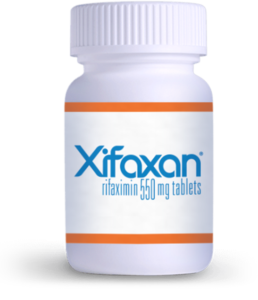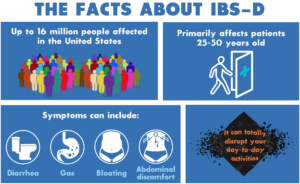This is a sponsored post. Salix Pharmaceuticals compensated FabOverFifty with an advertising sponsorship to write it. Regardless, we only recommend products or services that we believe will be informative for our readers. —Geri Brin
Her illness first erupted with stomach cramps and pains that would last for weeks at a time. Debilitating, uncontrollable diarrhea followed. Dawn Cobb was 44 and married with three young children. She had always been healthy.
She had colonoscopies, CAT scans, lactose testing, and stool tests, but everything checked out okay. Diets to still the diarrhea didn’t help either. Dawn stopped eating nuts when the doctor thought she might have diverticulosis. She didn’t!
Dawn’s life was in turmoil. The cramps and pain were bad enough, but never knowing when she’d have a surprise attack of diarrhea, Dawn stopped taking long walks with her friends and other activities that would prevent her from quickly getting to a bathroom. There was no pattern to her symptoms. Periodically, she’d even feel totally fine.

“I owned a retail shop at the time and I literally would bring changes of clothes or have to run home in the middle of the day,” Dawn said. “If I was going out to play tennis, I had to be really careful about what I ate that morning. I could just be sitting at home after having a cup of coffee and ruin my couch cover. I never knew what was going to happen.”
Dawn lived like this for 11 years, trying vainly to find a solution. “You can’t sit back and just accept that this is going to be your way of life. Doctors think you’re stressed, that you want attention, but you can’t let them think that you’re crazy. You have to know this isn’t right. Your body should not be doing this,” Dawn said.
Finally diagnosed with irritable bowel syndrome with diarrhea (IBS-D), Dawn at least knew she wasn’t crazy. But even if she had a name for her disease, there wasn’t a solution that worked for her, so she continued enduring her horrific symptoms for another five years. She also suffered in silence, not telling anyone–including her family–about her illness. I barely shared details about my episodes with my doctor, and she was a woman,” Dawn said.
When symptoms got out of hand about two years ago, and Dawn “just couldn’t take it anymore,” her doctor discussed different treatment options, one of which was surgical intervention. Seeming drastic to her, Dawn went to another gastrointestinal (GI) doctor for a second opinion. That’s when she learned about XIFAXAN® (rifaximin), a two-week treatment that received FDA approval in 2015 specifically to treat IBS-D in adults. Dawn told her long-time doctor about it, who agreed to write a prescription. Patients can be retreated up to two times if symptoms come back.
• XIFAXAN® (rifaximin) 550 mg tablets are indicated for the treatment of irritable bowel syndrome with diarrhea (IBS-D) in adults.
(See additional Important Safety Information below and click here for full Prescribing Information for XIFAXAN®.)
 “XIFAXAN ultimately worked for me,” said Dawn, now 62 years old. Dawn responded to her initial course of treatment, but did experience recurring symptoms. She was retreated, and she hasn’t needed to go back to her GI doctor since. “My doctor had mentioned I may have side effects like nausea but I had no nausea at all. I have been able to do things like walk four miles, not petrified that I’ll make it back without an incident. I no longer walk onto a plane afraid of what’s going to happen if the bathroom is occupied,” Dawn explained. “I tell everyone about XIFAXAN. I want other women who suffer with the same symptoms I had, but don’t talk about them, to find out about it. This is my experience with XIFAXAN. If you’re experiencing IBS-D symptoms, talk to your doctor to see if XIFAXAN is right for you.”
“XIFAXAN ultimately worked for me,” said Dawn, now 62 years old. Dawn responded to her initial course of treatment, but did experience recurring symptoms. She was retreated, and she hasn’t needed to go back to her GI doctor since. “My doctor had mentioned I may have side effects like nausea but I had no nausea at all. I have been able to do things like walk four miles, not petrified that I’ll make it back without an incident. I no longer walk onto a plane afraid of what’s going to happen if the bathroom is occupied,” Dawn explained. “I tell everyone about XIFAXAN. I want other women who suffer with the same symptoms I had, but don’t talk about them, to find out about it. This is my experience with XIFAXAN. If you’re experiencing IBS-D symptoms, talk to your doctor to see if XIFAXAN is right for you.”
To learn more about IBS-D and how XIFAXAN treats it, we spoke to Dr. Caterina Oneto, a gastroenterologist in New York City.∗
∗Dr. Oneto is not giving medical advice. Patients should talk to their healthcare professionals about what is right for them.
FABOVERFIFTY: WHAT CAUSES IBS-D?
DR. ONETO: “IBS-D is a complex and heterogeneous disease, and we don’t have a complete understanding of its cause or causes. Several factors seem to contribute to it, including an imbalance of the gut microbiota, visceral hypersensitivity (abnormal pain within the inner organs), motility abnormalities (uncommon intestinal contractions), psychosocial stressors (the mental, emotional, social, and spiritual dimensions of what it means to be healthy), and environmental factors.”
WHO IS MOST AFFECTED BY IBS-D?
“IBS affects about 10 percent of the population in the United States, and of those patients, about 60 percent have a diarrheal component.
“IBS is more common in women; in fact, 60 to 80 percent of participants in most IBS clinical trials are women, generally 25 to 50 years old. But you can get it when you’re older.”
 BESIDES THE SYMPTOMS DAWN COBB EXHIBITED (E.G. STOMACH CRAMPS AND PAINS THAT WOULD LAST FOR WEEKS AT A TIME AND DEBILITATING, UNCONTROLLABLE DIARRHEA), ARE THERE OTHER SYMPTOMS ASSOCIATED WITH IBS-D?
BESIDES THE SYMPTOMS DAWN COBB EXHIBITED (E.G. STOMACH CRAMPS AND PAINS THAT WOULD LAST FOR WEEKS AT A TIME AND DEBILITATING, UNCONTROLLABLE DIARRHEA), ARE THERE OTHER SYMPTOMS ASSOCIATED WITH IBS-D?
IBS-D symptoms can vary widely from one person to the next. However, the two most common are abdominal pain and diarrhea, which is what Dawn experienced. Having frequent and unpredictable diarrhea can be quite disruptive to a person’s personal and professional life and sometimes patients even avoid leaving their homes because they’re afraid to have ‘accidents.'”
WHY DID IT TAKE 18 YEARS FOR DAWN COBB TO GET AN OFFICIAL DIAGNOSIS?
“Sometimes patients don’t seek medical attention for their IBS symptoms. If they’re suffering from diarrhea and abdominal pain they may try to restrict their diet or use over-the-counter drugs. Or, they may accept their symptoms and tell themselves they just have a ‘sensitive stomach’. Patients who seek medical attention for their symptoms may just get antidiarrheals or antispasmodics, but a formal diagnosis will not necessarily be made.”
HOW IS AN IBS-D DIAGNOSIS MADE?
“The diagnosis of IBS-D, in most cases, can be made by taking a good history and performing a physical exam. When evaluating a patient with diarrhea and abdominal pain, it’s important to ask the right questions to determine if other symptoms are present, such as weight loss, rectal bleeding, anemia, and a family history of gastrointestinal cancers, IBD (inflammatory bowel disease) or celiac disease. These symptoms should make the clinician question the diagnosis of IBS and consider further evaluation that may include lab tests, imaging (like an ultrasound or CT scan) and possibly a colonoscopy and/or endoscopy.”
WHAT IS XIFAXAN AND HOW DOES IT WORK?
“Approved for the treatment of IBS-D in 2015, XIFAXAN is an antibiotic that works on the gut microbiome, a possible factor in IBS-D. Unlike other antibiotics prescribed to combat issues such as sore throats, sinus and urinary infections, XIFAXAN is minimally absorbed into the bloodstream, but stays within the GI tract to inhibit the growth of bacteria. This makes it a well-tolerated medication with a side effect profile similar to placebo. In clinical studies, the most common side effects associated with XIFAXAN for IBS-D were nausea and increase in liver enzymes.”

WHAT IS THE COURSE OF TREATMENT AND SUCCESS RATE?
“XIFAXAN is taken by mouth, three times a day, for 14 days. In clinical trials, some patients achieved lasting relief up to six months (relief ranged from 6-24 weeks; average of 10 weeks) after only one course of therapy.
“Those patients whose symptoms return can be retreated up to two additional times. Many patients appreciate XIFAXAN because it lets them control their IBS-D symptoms without taking daily long-term medications.”
XIFAXAN® (rifaximin) 550 mg tablets are indicated for the treatment of irritable bowel syndrome with diarrhea (IBS-D) in adults.
• XIFAXAN is not for everyone. Do not take XIFAXAN if you have a known hypersensitivity to rifaximin, any of the rifamycin antimicrobial agents, or any of the components in XIFAXAN.
• If you take antibiotics, like XIFAXAN, there is a chance you could experience diarrhea caused by an overgrowth of bacteria (C. difficile). This can cause symptoms ranging in severity from mild diarrhea to life-threatening colitis. Contact your healthcare provider if your diarrhea does not improve or worsens.
• Talk to your healthcare provider before taking XIFAXAN if you have severe hepatic (liver) impairment, as this may cause increased effects of the medicine.
• Tell your healthcare provider if you are taking drugs called P-glycoprotein and/or OATPs inhibitors (such as cyclosporine) because using these drugs with XIFAXAN may lead to an increase in the amount of XIFAXAN absorbed by your body.
• In clinical studies, the most common side effects of XIFAXAN in IBS-D were nausea (feeling sick to your stomach) and an increase in liver enzymes.
• XIFAXAN may affect warfarin activity when taken together. Tell your healthcare provider if you are taking warfarin because the dose of warfarin may need to be adjusted to maintain proper blood-thinning effect.
• If you are pregnant, planning to become pregnant, or nursing, talk to your healthcare provider before taking XIFAXAN because XIFAXAN may cause harm to an unborn baby or nursing infant.
You are encouraged to report negative side effects of prescription drugs to the FDA. Visit www.fda.gov/medwatch/ or call 1-800-FDA-1088.
For product information, adverse event reports, and product complaint reports, please contact:
Email: salixmc@dlss.com
Please click here for full Prescribing Information.
The XIFAXAN product and the XIFAXAN trademark are licensed by Alfasigma S.P.A. to © 2019 Salix Pharmaceuticals or its affiliates.
